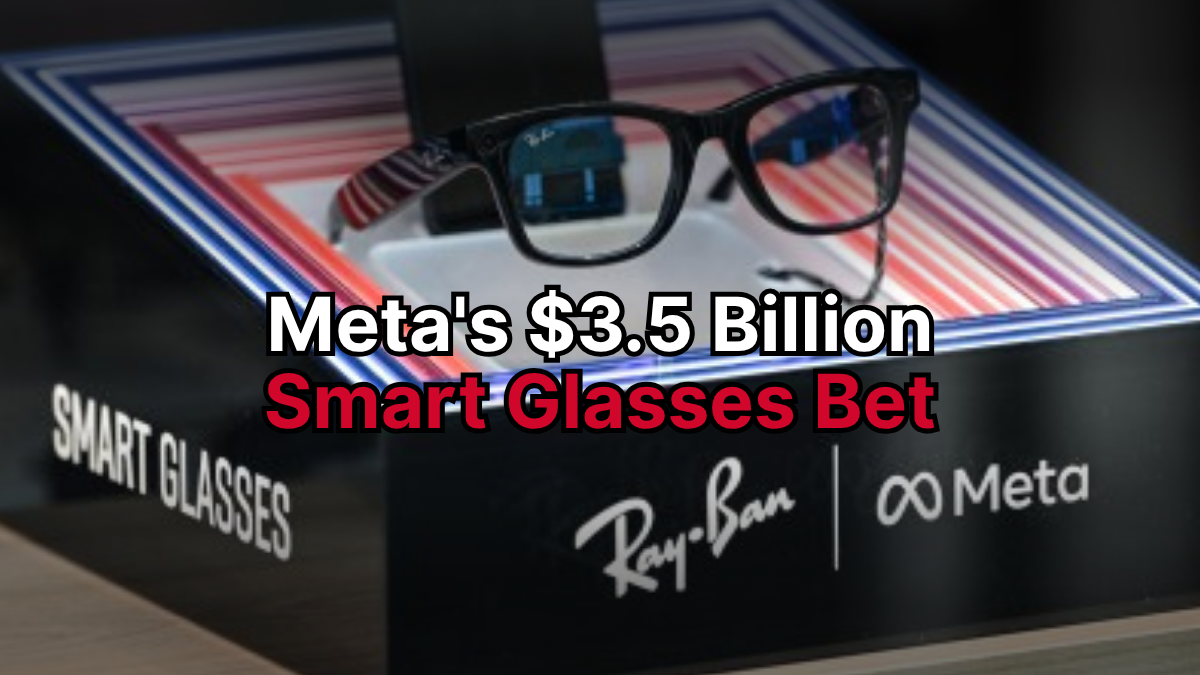Meta has just made a bold move that could reshape the wearable technology landscape. The tech giant invested $3.5 billion to acquire a 3% stake in EssilorLuxottica, the world’s largest eyewear manufacturer and maker of Ray-Ban sunglasses. This strategic investment signals Meta’s serious commitment to smart glasses and its vision for the future of AI-powered wearables.

But what does this investment really mean for consumers, investors, and the broader tech industry? Let’s examine the implications of this partnership and why it matters for the future of artificial intelligence and wearable technology.
The Strategic Partnership Behind the Investment
Meta’s relationship with EssilorLuxottica isn’t new. The companies have been collaborating for several years to develop AI-powered smart glasses. In 2021, Meta launched its first Ray-Ban smart glasses featuring built-in cameras and an AI assistant. More recently, the partnership expanded with the introduction of Oakley-branded smart glasses.
The $3.5 billion investment deepens this existing relationship significantly. According to sources familiar with the deal, Meta acquired just under 3% of the Italian-French eyewear giant, with plans to potentially increase its stake to around 5% over time.
This strategic move gives Meta several key advantages:
Manufacturing Expertise: EssilorLuxottica brings decades of experience in eyewear design and manufacturing. This expertise is crucial for creating smart glasses that people actually want to wear daily.
Global Distribution Network: The eyewear company has established distribution channels worldwide, providing Meta with immediate access to retail networks that would take years to build independently.
Brand Recognition: Ray-Ban and Oakley are iconic brands with strong consumer loyalty. This partnership allows Meta to leverage these established brands rather than building recognition from scratch.
Why Smart Glasses Matter for Meta’s Future
For Meta CEO Mark Zuckerberg, smart glasses represent more than just another product category. They’re a potential solution to one of the company’s biggest strategic challenges: platform dependency.
Currently, Meta delivers its apps and services primarily through smartphones created by competitors like Apple and Google. This dependency limits Meta’s control over user experience and business model decisions. Smart glasses offer a path to independence by creating a platform that Meta can fully control.
The implications extend beyond just hardware control. Smart glasses could become the primary interface for Meta’s AI ambitions. Instead of interacting with AI through smartphone apps, users could access AI assistants directly through their glasses, creating a more seamless and natural experience.
The AI Revolution in Wearable Technology
Meta’s investment comes at a crucial time for AI development. The current generation of smart glasses already includes features like:
- Voice-activated AI assistants
- Real-time translation capabilities
- Contextual information overlay
- Hands-free photography and video recording
But these capabilities are just the beginning. Future iterations could include:
Enhanced Reality Integration: Smart glasses could overlay digital information onto the physical world, providing navigation directions, object identification, and contextual data without requiring users to look at their phones.
Predictive AI: Advanced machine learning could anticipate user needs, automatically adjusting settings, suggesting actions, or providing relevant information based on context and behavior patterns.
Seamless Communication: AI could enable more natural communication by translating languages in real-time, transcribing conversations, or providing social cues and reminders.
Market Response and Financial Implications
The market reacted positively to news of the investment. EssilorLuxottica’s American depositary receipts rose as much as 6.9% to $148, marking their biggest intraday jump since April. Even competitor Warby Parker saw its shares rise 4.3% on the news, suggesting investor optimism about the smart glasses market overall.
For EssilorLuxottica, the partnership provides access to cutting-edge technology and a deeper relationship with one of the world’s most valuable tech companies. This technology integration could help the traditional eyewear manufacturer stay competitive as the industry evolves.
The financial commitment also demonstrates Meta’s confidence in the smart glasses market. With the company already investing heavily in AI research and development, this additional $3.5 billion investment shows that smart glasses are a core part of Meta’s long-term strategy.
Challenges and Considerations
Despite the promising potential, several challenges remain for widespread smart glasses adoption:
Privacy Concerns: Smart glasses with cameras and AI capabilities raise significant privacy questions. Users and bystanders may be uncomfortable with always-on recording devices.
Battery Life: Current smart glasses face limitations in battery technology. Extended use of AI features and connectivity can drain batteries quickly.
Social Acceptance: Smart glasses need to look and feel like regular glasses to achieve mass adoption. Bulky or obviously technological designs may limit appeal.
Regulatory Hurdles: As AI becomes more sophisticated, governments may implement regulations that affect smart glasses functionality and data collection.
The Competitive Landscape
Meta isn’t alone in pursuing smart glasses technology. Other major tech companies are developing similar products:
Apple has been rumored to be working on smart glasses for years, though the company hasn’t officially announced any products.
Google previously attempted smart glasses with Google Glass, though the product failed to achieve mainstream adoption.
Amazon has experimented with smart glasses through its Echo Frames product, focusing primarily on audio features.
Snapchat has released multiple generations of Spectacles, though these have remained niche products.
Meta’s partnership with Essilor Luxottica could provide a significant advantage in this competitive landscape by combining technological innovation with established eyewear expertise and brand recognition.
Looking Ahead: The Future of Smart Glasses
The success of Meta’s smart glasses initiative will likely depend on several factors:
User Experience: The glasses must be comfortable, stylish, and easy to use. If they feel cumbersome or look obviously technological, adoption will be limited.
AI Capabilities: The AI features must provide genuine value that justifies the cost and complexity. Simple novelty features won’t drive mass adoption.
Privacy Solutions: Meta will need to address privacy concerns through technical solutions and clear policies about data collection and use.
Price Point: Smart glasses need to be affordable enough for mainstream adoption while still providing sufficient functionality to justify the cost.
What This Means for Consumers and Investors
For consumers, Meta’s investment suggests that smart glasses are moving from experimental technology to mainstream products. The partnership with EssilorLuxottica indicates that future smart glasses will likely look more like traditional eyewear while providing increasingly sophisticated AI capabilities.
For investors, the move represents both opportunity and risk. The smart glasses market could become a significant growth area, but success isn’t guaranteed. The investment demonstrates Meta’s commitment to diversifying beyond social media and building new revenue streams through hardware and AI.
The Road to an AI-Powered Future
Meta’s $3.5 billion investment in Essilor Luxottica represents more than just a business deal. It’s a bet on a future where AI becomes seamlessly integrated into our daily lives through wearable technology. Smart glasses could become the primary interface between humans and artificial intelligence, changing how we access information, communicate, and interact with the world around us.
The partnership combines Meta’s technological expertise with EssilorLuxottica’s manufacturing capabilities and brand recognition. This collaboration could accelerate the development of smart glasses that are both technologically advanced and socially acceptable.
Whether this investment will pay off depends on execution and market acceptance. But one thing is clear: Meta is committed to being a leader in the next generation of AI-powered wearable technology. The success or failure of this initiative could significantly impact both companies and the broader tech industry for years to come.
The future of smart glasses is still being written, but Meta’s substantial investment suggests that future may arrive sooner than many expect.
FAQs About Meta’s Smart Glasses
Q. What are smart glasses?
A. Smart glasses are wearable devices that integrate technology, such as augmented reality (AR), cameras, and AI-powered applications, into the design of traditional eyewear. They aim to enhance everyday experiences by providing hands-free access to information and digital tools.
Q. Why has Meta invested in smart glasses?
A. Meta’s $3.5 billion investment in partnership with Essilor Luxottica signifies their commitment to advancing the development of AI wearables and augmented reality technologies. This aligns with their vision of shaping the future of connectivity and digital experiences.
Q. What makes this investment significant?
A. This substantial investment highlights Meta’s focus on innovation in the tech industry, particularly in emerging technologies like AR and AI. It demonstrates their intention to lead in the development of smart wearables and drive wider adoption of these technologies.
Q. When will Meta’s smart glasses be available?
A. While an exact timeline hasn’t been announced, Meta has made substantial progress in this area. Their collaboration with EssilorLuxottica is a step toward bringing advanced smart glasses to market in the near future.
Q. How will smart glasses change the industry?
A. Smart glasses have the potential to revolutionize how we interact with the digital world by integrating it seamlessly into our everyday lives. From enhancing productivity to reshaping social interactions, they represent a significant leap forward in wearable technology.
For More Information CLICK




